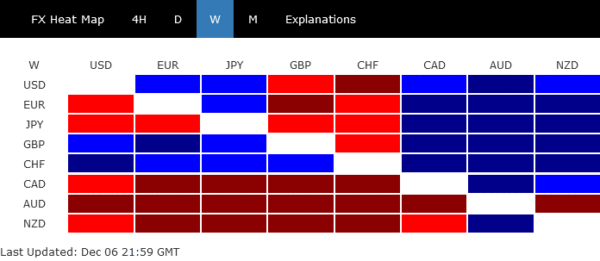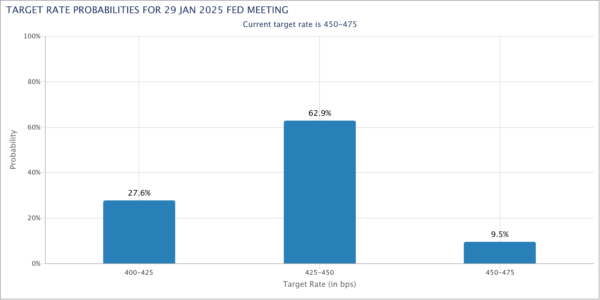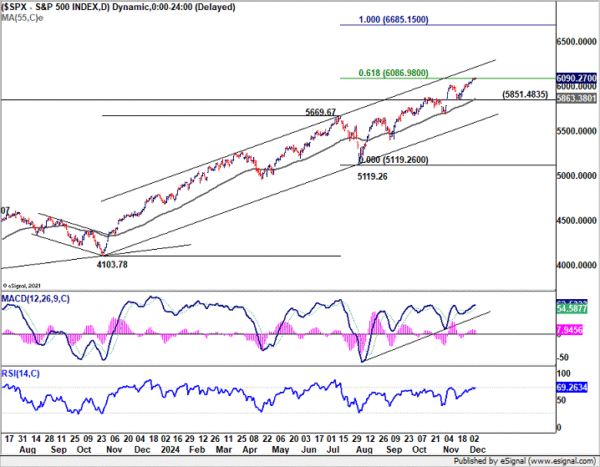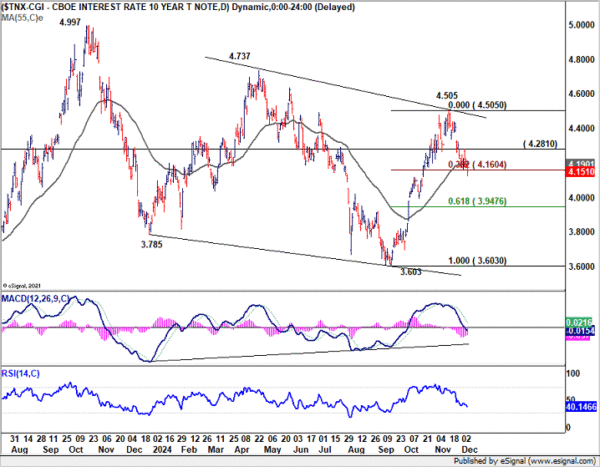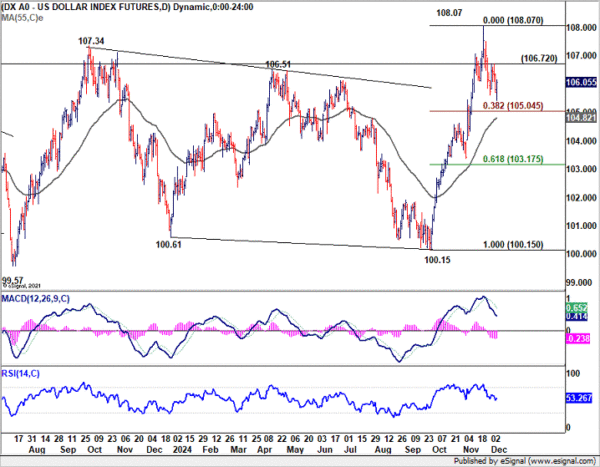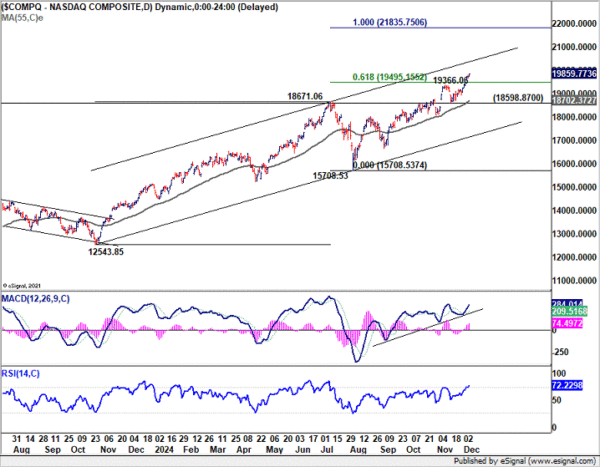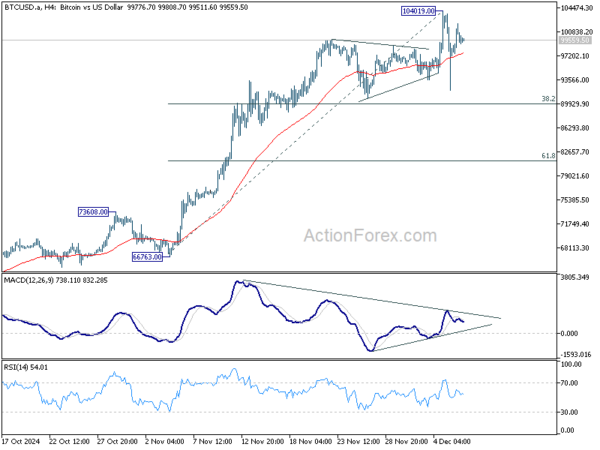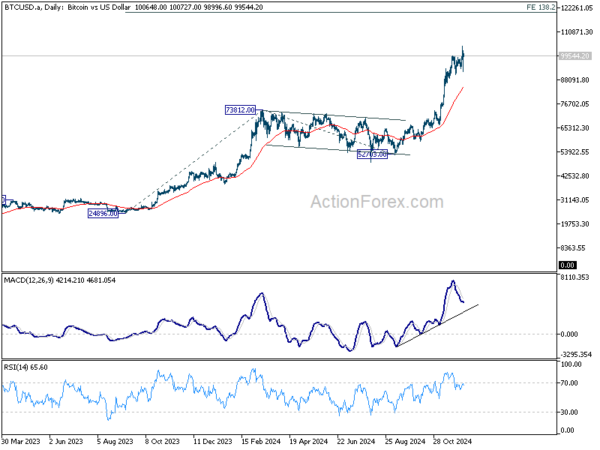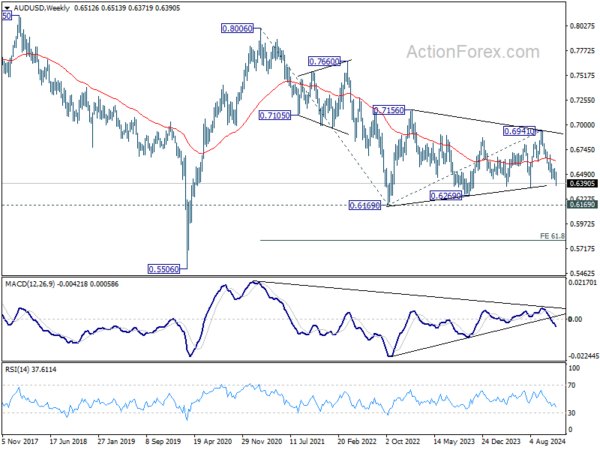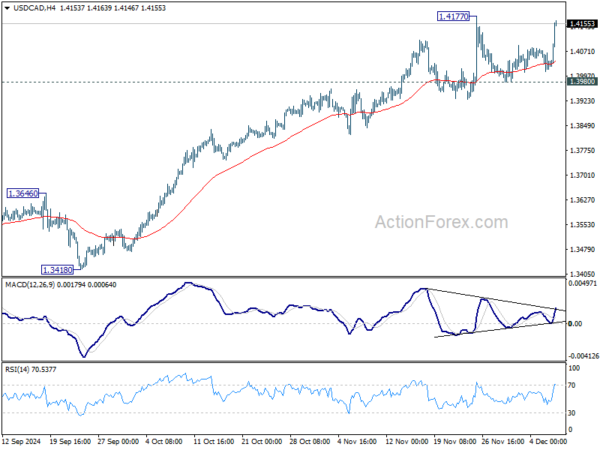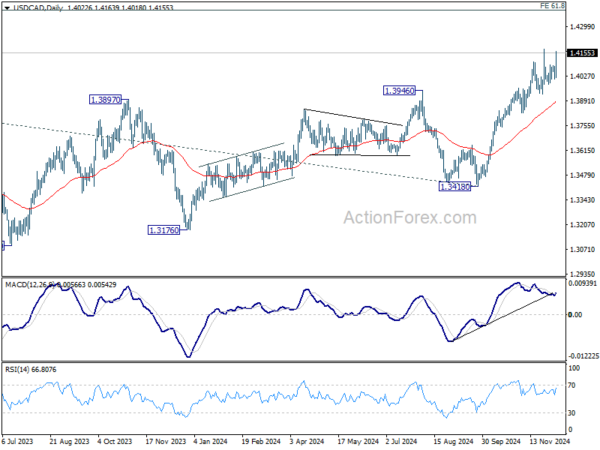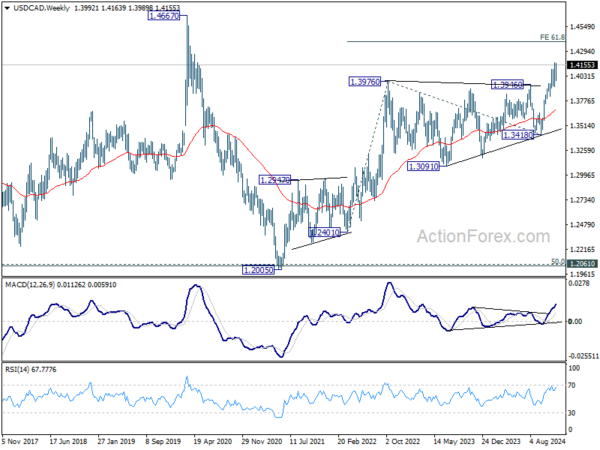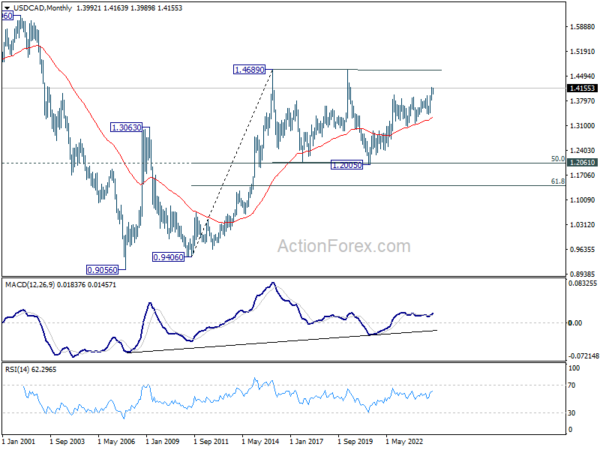The resurgence of “Trump Trade” last week reignited optimism across financial markets, driving US stocks to fresh record highs and propelling Bitcoin past the critical 100k psychological level. Investors appeared largely unfazed by a slew of top-tier US economic data and the solidification of expectations for a 25bps Fed rate cut this month. Instead, the market focused on the longer-term implications of President-elect Donald Trump’s pro-business policies, including reduced regulation and a reinvigorated push for US economic dominance.
Dollar saw mixed performance as it extended its correction against European majors but gained strength against commodity-linked currencies. While Fed is widely expected to deliver a 25bs rate cut this month, markets are bracing for a markedly slower pace of easing in 2025. Dollar’s underlying strength could resurface soon, bolstered by expectations of policies under Trump that are perceived as supportive of the greenback.
The tariff-related risks, particularly with China, are amplifying uncertainties for commodity-linked currencies. Aussie has emerged as the worst performer among them, plagued by concerns of renewed US-China trade tensions and a lackluster domestic economic outlook. Market chatter about potential material depreciation next year has gained traction, especially as analysts eye a possible acceleration in RBA’s easing cycle.
Meanwhile, European majors have benefited from the Dollar’s correction, but their resilience may be short-lived. Upcoming ECB and SNB meetings could deliver dovish guidance, adding downside risks for Euro and Swiss Franc. Sterling has stood out among European currencies, supported by expectations that BoE will adopt a gradualist approach to policy easing. However, the British currency faces its own challenges, lacking the decisive momentum to break out of its ranges against Euro and Swiss Franc.
Record-Breaking S&P 500 Gains as Fed’s December Cut Looks Certain, Yields and Dollar Ease
After a week rich in critical US data, Fed’s next move appears increasingly certain. Market expectations for a 25bps rate cut solidified, with Fed fund futures pricing an 86% probability, up from 66% just a week ago. ISM Manufacturing and Services Indexes reflected further softening in the economy, as non-farm payroll report showed slight signs of labor market loosening. While job growth remained robust, it lacked the strength to dissuade Fed from taking another easing step.
However, attention is pivoting to January, with discussions emerging about a pause in rate reductions, supported by comments from some Fed officials. St. Louis Fed President Alberto Musalem noted the need to “consider slowing the pace of interest rate reductions or pausing,” citing the importance of carefully assessing economic conditions and the outlook.
Cleveland Fed President Beth Hammack echoed this cautious approach, suggesting “we are at or near the point where it makes sense to slow the pace of rate reductions”, and that “allow us to calibrate policy to the appropriately restrictive level over time given the underlying strength in the economy.”
Reflecting these sentiments, futures markets show only a 27.6% chance of a further 25bps cut in January, compared to a dominant 72.4% expectation for holding rates steady.
The US stock market has embraced the evolving outlook. With the economy demonstrating resilience and Fed pursuing gradual easing, and optimism over the incoming administration’s policies has bolstered sentiment. S&P 500 logged its third consecutive weekly gain, closing at a new record.
Technically, S&P 500 is now entering a resistance zone between 61.8% projection of 4103.78 to 5669.67 from 5119.26 at 6086.98 and medium term rising channel resistance at around 6220. Upside momentum could start to wane in this zone, especially considering that year-end holiday period is approaching.
Nevertheless, outlook will continue to stay bullish as long as 5851.48 support holds. Decisive break of 6080/6220 resistance zone could prompt upside acceleration to 100% projection at 6685.15 in late Q1 or early Q2.
10-year yield extended the decline from 4.505 in reaction to readjusted Fed outlook following NFP. The break of 38.2% retracement of 3.603 to 4.505 at 4.160 suggests that deeper correction is now underway. Further fall is expected as long as 4.281 resistance holds, in case of recovery. TNX would now target 61.8% retracement of 3.603 to 4.505 at 3.947, which is slightly below 4% mark.
The combined environment of risk-on sentiment and falling yields could keep Dollar Index pressured for the near term. Yet, downside would likely be relatively limited considering the slower easing pace of Fed in 2025. Also, the terminal rate of Fed in the current cycle would likely be higher than most of the peers, at least comparing to ECB.
Technically, the structure of the fall from 108.07 is also corrective. So, in case of deeper correction, strong support would likely be seen between 55 D EMA (now at 104.82) and 38.2% retracement of 100.15 to 108.07 at 105.04 to contain downside. Meanwhile, break of 106.72 resistance will indicate that the corrective pattern from 108.07 has already started the second leg back towards this high.
Tech and Crypto Surge as Trump’s Picks Stoke Optimism
The US tech sector and cryptocurrency markets closed the week with significant gains, riding a wave of optimism fueled by the Trump administration’s pro-crypto and tech-focused appointments. Paul Atkins, a well-known advocate for digital innovation, has been nominated to lead the SEC, a move widely interpreted as a green light for regulatory support of the cryptocurrency space. Meanwhile, the naming of former PayPal COO David Sacks as “White House AI & Crypto Czar” added further momentum, energizing both tech and crypto investors. These developments propelled Bitcoin past the 100k milestone and pushed the NASDAQ to new all-time highs.
Technically, NASDAQ’s up trend made notable progress by breaking through 61.8% projection of 12543.85 to 18671.06 from 15708.53 at 19366.06. 20k handle is now within reach, but the key hurdle lies in medium term rising channel resistance at around 20300. Decisive break of this level could prompt upside acceleration to 100% projection at 21835.75. In any case, outlook will now stay bullish as long as 18702.37 support holds.
Bitcoin’s week was characterized by dramatic volatility. The cryptocurrency achieved a historic high of 104019 before a steep pullback, attributed to a USD 1B liquidation wave within 24 hours of crossing the 100k mark. However, the swift rebound underscored the market’s resilience, as bullish sentiment quickly returned.
Technically, while some consolidations could be seen in Bitcoin in the near term, outlook will stay bullish as long as 38.2% retracement of 66763. to 104019 at 89787 holds. Break of 104019 will resume larger up trend towards 138.2% projection of 24896 to 73812 from 52703 at 120304.
The momentum for Bitcoin’s next rally could be significant, particularly if traders who closed long positions during the pullback re-enter the market.
Rapid RBA Policy Shifts Could Trigger Significant Downside for AUD in Coming Year
Commodity-linked currencies were the outliers this week, underperforming despite a broader surge in risk-on sentiment. Persistent fears over a potential tariff war between the U.S., Canada, and China have been a significant drag on currencies like the Australian and Canadian dollars. Adding to the pressure, the U.S. dollar remained resilient as expectations solidified for a slower pace of Fed rate cuts, further weighing on commodity currencies.
Aussie has been particularly vulnerable, with analysts revising their outlooks. The Commonwealth Bank of Australia now anticipates AUD could fall “materially” to as low as 0.60 against USD next year.
RBA remains hesitant to commence monetary easing, with May 2025 still seen as the most likely timing for the first rate cut, not even February. However, weaker-than-expected Q3 GDP data has highlighted the fragility of the Australian economy. The narrative regarding RBA’s policy easing could shift if disinflation accelerates significantly in Q1, forcing the central bank to ease faster than originally expected once the cycle commences.
China’s economic sluggishness adds another layer of uncertainty for AUD. Despite stimulus measures, the Chinese economy continues to underperform, compounded by renewed trade tensions with the US. Should these pressures escalate, Australia’s trade-reliant economy could face additional headwinds, amplifying downside risks for its currency.
Technically, one of the various interpretation of the price actions from 0.6169 (2022 low) is that the medium term consolidation pattern from 0.6169 has completed with three waves to 0.6941. That is, the down trend from 0.8006 (2021 high) might be ready to resume. While it’s still early to make a conclusion, break of 0.6269 support would support this bearish case. The medium term target could be tentatively set at 61.8% projection of 0.8006 to 0.6169 from 0.6941 at 0.5806.
USD/CAD Weekly Outlook
While USD/CAD extended the consolidations from 1.4177 last week, the late surge argues that larger up trend might be ready to resume. Immediate focus is now on 1.4177 resistance this week. Decisive break there will confirm this bullish case and target 1.4391 projection level next. Rejection by 1.4177 will delay the bullish case and bring more consolidations. But outlook will continue to stay bullish as long as 1.3980 support holds.
In the bigger picture, up trend from 1.2005 (2021) is in progress. Next target is 61.8% projection of 1.2401 to 1.3976 from 1.3418 at 1.4391. Now, medium term outlook will remain bullish as long as 1.3418 support holds, even in case of deep pullback.
In the longer term picture, price actions from 1.4689 (2016 high) are seen as a consolidation pattern, which might have completed at 1.2005. That is, up trend from 0.9506 (2007 low) is expected to resume at a later stage. This will remain the favored case as long as 1.3418 support holds.

